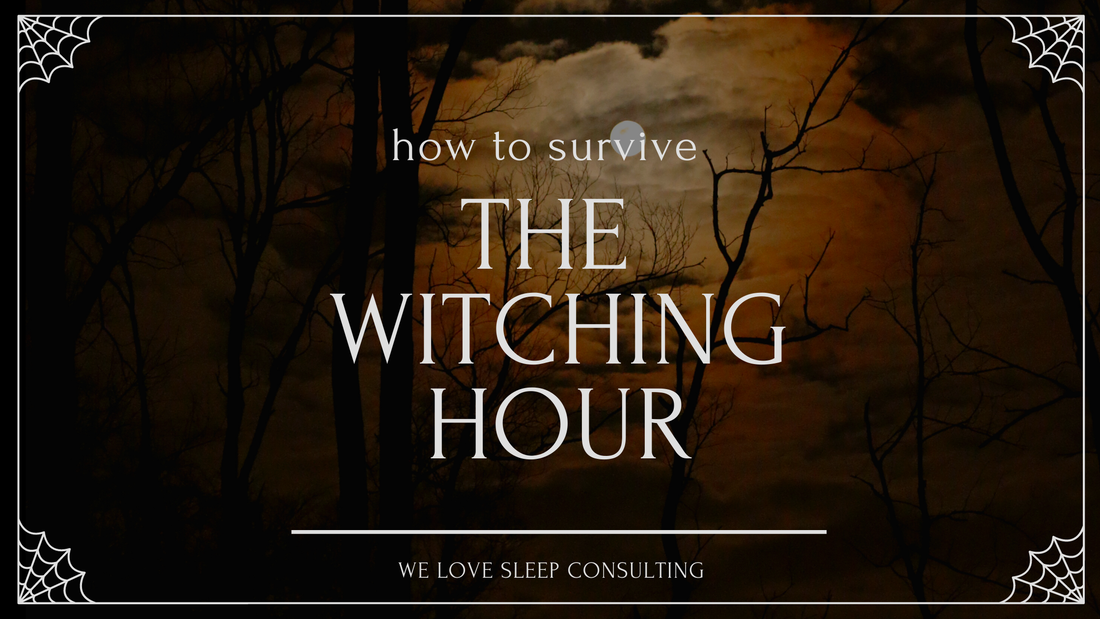|
I remember being a new mom and crying in the evening with my sweet baby, who was crying and inconsolable. I had tried feeding, changing, rocking, and wasn't sure what was wrong with my young baby. I remember sitting on the couch just crying and feeling horrible because I couldn't help him and make him stop crying. My twin sister (whose kids were a few years older than mine) told me it was the "witching hour" and it would go away soon . . . and she was right! The fussy, inconsolable evenings didn't last forever, and I learned some tips and tricks that made the evenings a bit more bearable.
What is the witching hour? The "witching hour" is a time period usually between 5-6pm until 11pm where young babies are extra fussy, even inconsolable. It normally starts around 3 weeks old and peaks at 6 weeks old, and tends to taper off around 12 weeks old. What causes it? There isn't an exact known cause, but these are five are reasons newborn babies are typically fussy. The baby may be . . . 1. Gassy - I've heard many breastfeeding new moms say they feel guilty when their new babies are gassy because it must be something they've eaten, and while in some rare cases, a mother's food may affect the baby through the breastmilk if the baby has a true food allergy or sensitivity, in the majority of cases, new babies are gassy simply because their digestive tracts are new and still working out the kinks and crying can also lead to sucking in more air, which causes more gas. It's very normal for new babies to be gassy, whether they are breastfed or formula fed. 2. Overtired - Newborn babies have very short wake windows. If they end up staying awake too long or not getting enough sleep, they can easily become overtired, which in turn, causes them to become more fussy and makes it even harder for them to get to sleep. 3. Hungry - Especially for breastfed babies, the prolactin levels in breastmilk are at the lowest in the early evening so babies may cry or cluster feed to get more milk. It doesn't always mean they need supplementation, but cluster feeding itself can do the job of building a stronger supply. 4. Overstimulated - It's easy for newborns to become overstimulated. 5. Experiencing a Growth Spurt - Babies go through a major growth spurt at 6 weeks old, and may become extra tired, extra hungry, or extra fussy (or all three), and sleep is often at its worst at 6 weeks. Here are 10 tips to survive the witching hour: The Five S's - Use the technique to help calm fussy babies. Do these steps in this order, all at once.
Change of Scenery - Go outside or to another room, or even to a friend or relative's house. Standing out on the back porch was a common occurrence during the evening hours when my babies were newborns. Use a Baby Carrier - When my baby was very fussy, I knew I could usually calm her down with a ride in a cozy baby carrier (like this one) and a walk around the house or the neighborhood. A Dark, Quiet Room - Babies who are overstimulated may need to go somewhere dark and boring, with white noise (or background noise, such as a TV show). My newborn baby spent many evenings cuddled in my arms in my bedroom at night, watching re-runs of The Office, which seemed to calm her. Cluster Feed - Let the baby nurse or feed as much as they need during this time. It can help calm them and help build a strong breastmilk supply for nursing mamas. Sleep - Help an overtired baby get to sleep and prevent over tiredness by watching daytime wake windows and making sure they aren't awake longer than an hour at the most. Bath - Some newborns hate the bath, but if you can master the newborn bath, many babies love them and are relaxed by them. You can even get in a bath with your baby. A key I learned is keeping a warm and wet washcloth over the parts of their body that are exposed to the cold air helps them stay warmer and enjoy the bath. Lotion and Massage - Many babies love massages, and scents can be relaxing and calming for babies. Ask for Help - It's ok to call a friend or family member to come help while you go rest or take a break. Dealing with a crying baby can be emotionally taxing, and getting help is important. Use a swing - Swings with rhythmic motions and different sounds (or moving mobiles) can hep distract fussy babies. Try different sounds, such as shushing sounds, ocean, music, or white/pink noise. *Note: only use a swing when your baby is awake and supervised, as these are not safe for sleep. If all else fails, grab a glass of wine and tell yourself it won't last forever! I know it seems like forever when you're holding an inconsolable baby, but those newborn days will fly by, and before you know it, your child will be a 2 year old, running around playing and laughing. So tell yourself it's just a season and you will get through it. Did your baby experience the witching hour? What did you do to get through it? Leave a comment and share!
1 Comment
10/25/2021 09:45:29 pm
I’m not that much of an internet reader to be honest but your blogs really nice, keep it up! I’ll go ahead and bookmark your website to come back down the road.
Reply
Leave a Reply. |
Lynne HowardPediatric Sleep Consultant Archives
June 2023
Categories |


 RSS Feed
RSS Feed
